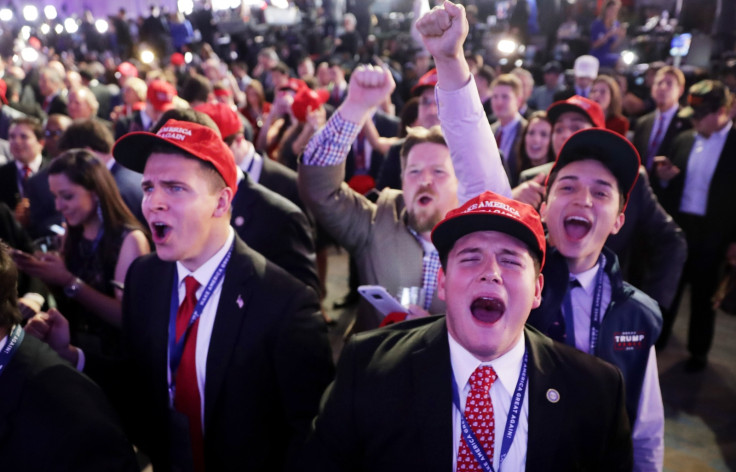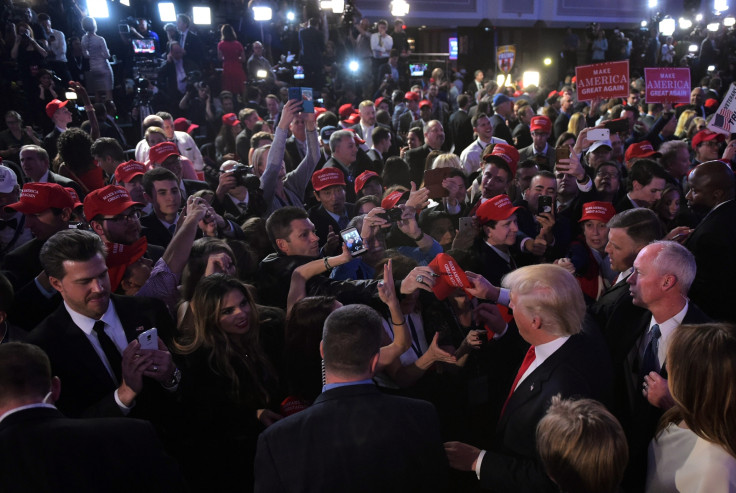If you didn't think Trump could win, you weren't watching closely enough
The 2016 election represents a stunning vindication of Donald Trump.

Many will say that Donald Trump's successful campaign for the presidency of the United States was the ultimate black swan, his victory last night an unprecedented event that could not have been fairly forecast.
These people are talking nonsense. Too many liberals took refuge in nonsensical models that did not allow for the near-certainty that polling error is strongly correlated across states, especially demographically similar states. Nate Silver has taken a lot of flack this election. He has been vindicated. My own forecasts generally tracked those of FiveThirtyEight, but were more stable and more Trump-optimistic. Overall I was generally more bullish on Republican prospects, and rightly so in the end. The GOP looks almost certain to retain control of the Senate, and of course the House, giving it a complete stranglehold on political power for the next two years, and most likely for the next four.
Furthermore, given historical trends, a generic Republican would probably have beaten a generic Democrat in this cycle. Donald Trump, in my opinion, was far from the only candidate in the Republican primary likely to beat Hillary Clinton, a weak candidate with terrible favorability, fatally compromised by scandal and lack of charisma. Marco Rubio and John Kasich probably would have got the job done comfortably; Jeb Bush and Ted Cruz would at least have stood a chance. Framed in that context, a Trump victory doesn't look quite so shocking.
Nevertheless, the election represents a stunning vindication of Trump, who overcame his own atrocious favorability ratings, marmite personality, paucity of political experience, and lack of funding and institutional support from the mainstream Republican party. He took the infamous Sailer Strategy and made it work, winning over rural white voters on an unprecedented scale, most notably in the Midwest.
He won back Wisconsin, Ohio, and Iowa. Former regions of large-scale manufacturing, hit hard by the shock of Chinese competition, proved to be especially strong areas of Trump support. He took back both Michigan and Pennsylvania, both states with large low-education blue-collar white populations; states that no Republican has won since 1988.
In his acceptance speech Trump struck the perfect tone; quiet, conciliatory, and gracious.
After Trump, there is no going back. He will remake the Republican party in his image. He will very likely be a one-term President; his term will no doubt contain a good few damaging scandals, and in any case he will be 74 in 2020. His successor, however, will not be a movement conservative of the type that has defined the GOP since Reagan. They will be a softer, kinder, quasi-Trump; a blue-collar Republican able to appeal to both the white working class, upwardly mobile ethnic minorities, and traditional conservatives. There are any number of possible candidates; the newly re-elected Senator Rob Portman of Ohio, or perhaps Donald Trump Jnr, or even a rebranded Marco Rubio.
Trump, as he did in the primary, shattered all the orthodoxies of conservatism. The thrice-married biblically illiterate degenerate captured vast swathes of the white evangelical Christian vote. While this illustrates the decline and corruption of American Christianity, it also signals to future GOP primary contenders that they need not explicitly pander to the evangelical vote in order to win it. Ted Cruz is as irrelevant to the future of the GOP as Jeb Bush.

In his acceptance speech Trump struck the perfect tone; quiet, conciliatory, and gracious. He complimented Clinton on her great services to America, and called for union and harmony. It was Trump at his best; unpolished, yet very human, authentic and likeable. If a Trump presidency can be successful, it must maximize those undoubted great gifts whilst minimizing his glaring weaknesses (most notably an over-reliance on intuition). Personally, I think the best tactic is to get a Republican-controlled Congress to pass a gargantuan infrastructure spending bill and send Trump on an epic four-year road trip cutting ribbons, delivering speeches, wearing hard hats, posing with drills, and generally making America great again, and, perhaps more importantly, visibly showing white America that their country is becoming great again. The nitty-gritty of everyday governance can be left to the professionals. Peter Thiel as the acting CEO of America, anyone?
As for the Democrats, their party is in utter disarray, facing extraordinary challenges at the state level. They suffer from a desperate paucity of talent (as witnessed in this cycle by their inability to come up with a convincing alternative to Clinton in the primary). They must identify new convincing contenders for 2020, whilst not retreating into the shell of identity politics. Faced with Trump's ethnically-tinged nationalist agenda, the temptation for the Democrats is to identify even more strongly as the party of ethnic minorities (allied with highly-educated urban whites). This strategy will ultimately spell electoral and moral disaster. Polarisation works both ways; in the not-so-long-term, sharply identified ethnic minority voting blocs simply encourage lower-status whites to regard themselves as simply just another identity bloc, and vote accordingly. Obama's victories were ultimately built on the backs of swathes of rural whites on Iowa, Ohio, and elsewhere. It is those voters who have abandoned Clinton for Trump. The Democrats cannot afford to lose them for a generation.
Andrew Sabisky is an independent research worker and writer
© Copyright IBTimes 2025. All rights reserved.






















